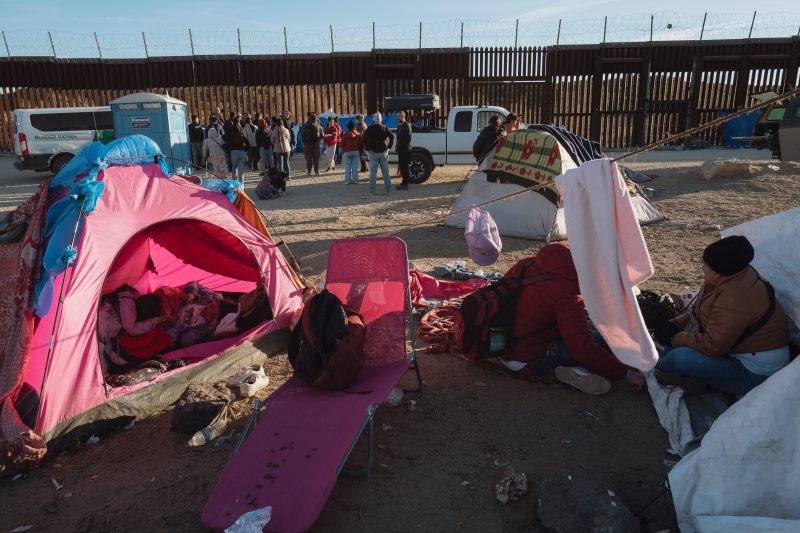Americans’ concerns about immigration have risen sharply this year, with half of Americans saying that the large number of immigrants and refugees entering the country is a “critical threat” to U.S. interests, up from 42 percent last fall to the highest level since 2010, according to a poll by the Chicago Council on Global Affairs.
The poll found that most Americans support two proposals laid out by former president Donald Trump: using U.S. troops to stop immigrants from coming into the United States from Mexico and expanding a wall on that border.
But a larger majority of Americans oppose Trump’s proposal to put undocumented immigrants in mass-detention camps. If elected, Trump has pledged to immediately launch “the largest domestic deportation operation in American history.”
The Chicago Council poll comes as Trump tries to paint Vice President Harris, the Democrats’ likely nominee for president, as responsible for illegal border crossings that have happened since President Biden took office. Harris was asked by Biden to oversee efforts to stem migration from Central America. Illegal border crossings soared during the Biden administration, then dropped recently because of factors including a shift in administration policy.
The Trump campaign’s first television ad of the general election attacks Harris for failing to prevent millions of illegal border crossings, claiming this led to fentanyl deaths, crime and terrorism risks. The ad made several misleading claims.
A late July Wall Street Journal poll found that voters thought Trump would handle immigration better than Harris by 53 percent to 40 percent.
Chicago Council’s poll found 50 percent of Americans say large numbers of immigrants and refugees coming into the United States is a critical threat to the country’s interests, marking the highest level in Chicago Council polling since 2010, when it was 51 percent. Concerns over immigrants as a threat peaked at 60 percent in 2002, less than one year after the Sept. 11 terrorist attacks. The United States has about 45 million immigrants, about 11 million of whom are undocumented.
In response to a separate question, 44 percent of Americans said immigration mattered “a great deal” in their decisions of whom to vote for in the presidential election. That ranked behind protecting U.S. democracy (59 percent), the economy in general (58 percent) and inflation (53 percent). Immigration was at about the same level as abortion policies (43 percent), a little above crime (39 percent), and well above the Russia-Ukraine war (19 percent) and the Israel-Gaza war (17 percent).
Republicans ranked immigration third in importance, with 69 percent saying it mattered a great deal, behind the economy in general (76 percent) and inflation (75 percent). About 4 in 10 independents said immigration mattered a great deal to their votes (41 percent), behind the economy (54 percent), protecting U.S. democracy (51 percent) and inflation (48 percent). Just about a quarter of Democrats said immigration mattered a great deal to their vote (26 percent), ranking below every issue but the two ongoing wars.
Looking at specific policies proposed by Trump, 53 percent of Americans favored using U.S. troops to stop immigrants from coming into the United States from Mexico, an increase from 47 percent in 2023 and 49 percent in 2019. While support was highest among Republicans, half of independents and 3 in 10 Democrats supported sending troops to stop immigrants.
A similar 55 percent of Americans favored expanding the 700-mile wall and fencing on the U.S.-Mexico border. That also is an increase, from 41 percent in 2019 and 48 percent in 2016. A wide majority of Republicans supported expanding the wall this year (89 percent). Independent support for the wall grew from 42 percent in 2019 to 53 percent this year. And while most Democrats opposed it, Democratic support for expanding the wall more than doubled from when Trump was in office in 2019, from 11 percent to 26 percent.
But mass camps for undocumented immigrants are widely unpopular. By a roughly 2-to-1 margin, Americans opposed detaining millions of undocumented immigrants in mass camps while they await immigration hearings, 65 percent to 33 percent. And while most Republicans supported it (57 percent), support dropped to 30 percent of independents and 18 percent of Democrats.
Those findings were similar to an April Pew Research Center poll that found majority opposition to a national effort to deport undocumented immigrants, but majority support among Trump voters.
However, a January CNN poll showed higher support for mass-deportation efforts, finding nearly half of Americans favored Trump trying to “detain and deport millions of undocumented immigrants” if he becomes president again. About 9 in 10 Americans thought Trump would try to detain and deport millions of undocumented immigrants if he became president again.
A separate question in the Chicago Council poll provided respondents with four options the United States could implement to manage undocumented immigrants. A majority said they should be allowed to stay in the country, including 29 percent who said they should be allowed to apply for U.S. citizenship and 26 percent who said they should eventually be allowed to apply for citizenship after paying a penalty and waiting for a number of years. Another 4 percent said they should be allowed to stay but not apply for citizenship, while about 4 in 10 said undocumented immigrants should be required to leave the United States (39 percent).
Americans expressed mostly positive opinions of immigrants on other questions in the survey.
About 6 in 10 Americans said that immigrants from other cultures have a “mainly positive” impact on American society, including majorities of Democrats and independents. Most Republicans said immigrants negatively affect society.
And roughly 7 in 10 Americans said illegal immigrants “mostly take jobs that nobody wants,” while about 3 in 10 said they “mostly take jobs from Americans who need them.” That’s a significant shift from 2010, when the public split about evenly on whether immigrants took jobs from Americans or jobs that nobody wanted.
Despite widespread immigration concerns, a minority of Americans overall want to decrease the levels of legal immigration into the country. One-third of Americans (33 percent) said that legal immigration levels should be decreased, roughly the same share as last year and down from 39 percent during Trump’s first presidential campaign in 2016. This year’s survey found a 44 percent plurality of Americans said legal immigration should be kept at present levels, while another 22 percent said legal immigration should be increased.
The Chicago Council on Global Affairs poll was conducted online from June 21 through July 1 among a national sample of 2,106 American adults with an error margin of plus or minus 2.3 percentage points. The sample was drawn through Ipsos’s KnowledgePanel, an ongoing survey panel recruited through random sampling of U.S. households.
Scott Clement contributed to this report.










